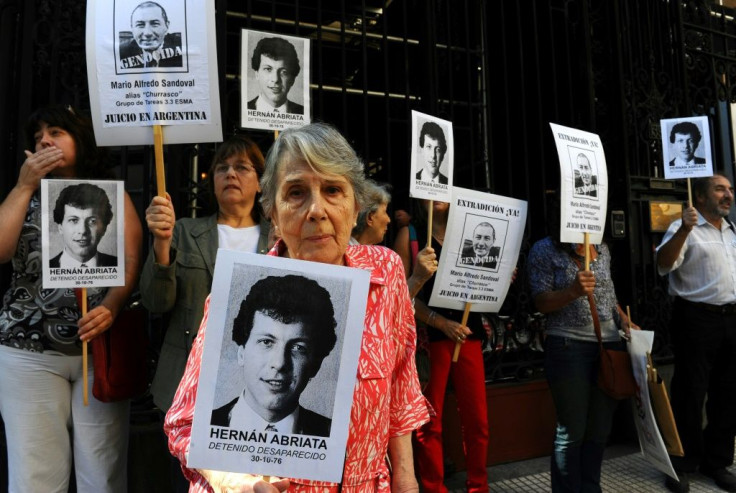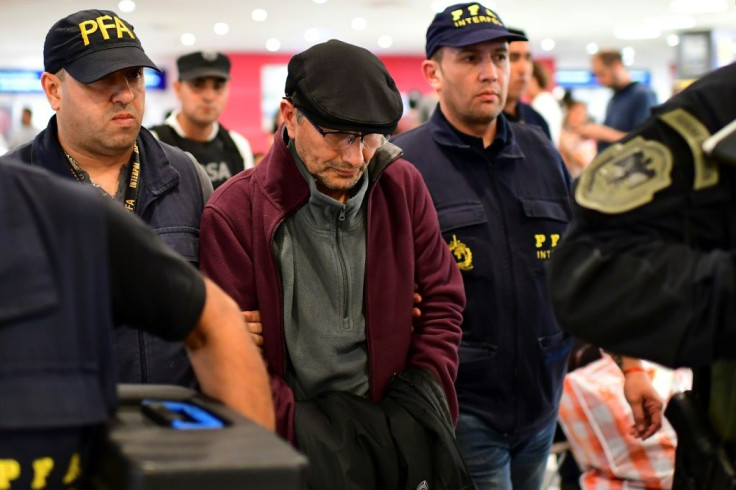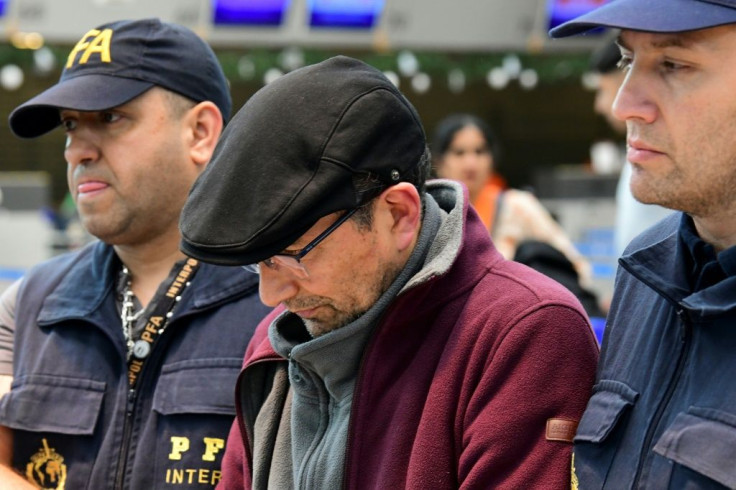Suspect In 'Dirty War' Murder Extradited To Argentina

An Argentine ex-police officer linked to the murder of hundreds of people during the country's "dirty war" arrived in Buenos Aires on Monday, after France extradited him to face trial over the disappearance of a student.
Mario Sandoval was arrested Wednesday at his home near Paris, after French authorities gave the final go-ahead for his extradition, ending an eight-year legal battle.
The 66-year-old, who had been living in France since 1985 and obtained French citizenship with few aware of his full identity, left Paris around midnight on Sunday.
Wearing a dark cap and a blue fleece jacket, the bespectacled and slightly bowed Sandoval was escorted by police through Ezeiza airport upon his arrival in Buenos Aires. An overcoat hung over his handcuffed hands.
SWAT police with automatic weapons flanked the group as he was led to a waiting police car.
"The French government probably assumed that if he was extradited under (former president Mauricio Macri), he would be released immediately," said Daniel Tarnopolsky, the Argentine representative to UNESCO's International Center for the Promotion of Human Rights (CIPDH).
Tarnopolsky, whose family was abducted and presumed killed during the war, told AFP that under current President Alberto Fernandez, Sandoval "will be judged and will not walk away."
Argentina suspects that Sandoval took part in more than 500 cases of kidnappings, torture and murder at a time when some 30,000 were "disappeared" during the 1976-83 military dictatorship.
But the extradition concerns only the alleged kidnapping in October 1976 of Hernan Abriata, an architecture student whose body has never been found.
Argentine authorities say investigators have several witness accounts linking Sandoval -- known there as the "butcher" of the dictatorship -- to Abriata's killing.
Sandoval's lawyers had argued that he would not get a fair trial in Argentina, claiming he would face torture or poor detention conditions, but their appeals to the European Court of Human Rights failed.

Argentina's foreign ministry said the extradition "consolidates the principle that crimes against humanity should not go unpunished."
Sophie Thonon, a lawyer acting for Argentina, told AFP that Abriata's 92-year-old mother Beatriz Cantarini de Abriata had been "desperately waiting" for Sandoval to "explain himself before Argentine justice."
Sandoval, who has dismissed the accusations as fabrications, fled Argentina after the military junta fell.

Despite taking French nationality, Argentina was able to extradite him as the alleged crime took place beforehand.
The French Council of State, which advises the government on legal matters, approved his extradition in August 2018, prompting Sandoval to appeal.
The Constitutional Council determined that no statute of limitations could be applied to an "ongoing" case, citing the fact that Abriata's body has never been found.
"It's been eight very long years since the extradition process began in 2012," Carlos Loza, who was held in a cell with Abriata, told AFP after Sandoval's arrival in Argentina.
"Today is the terrible anniversary of our 'disappearance' on December 16, 1976," said Loza, then aged 23 and held in a cell with four others after their arrest at a local Communist Party office in the Buenos Aires district of Barracas.
"We were all released that January. One committed suicide in 2012, because he could not overcome what we had lived through, another died from an illness."
Loza says he does not know if Sandoval was involved in his own case.
"When we got out, it took us a month to find the courage to go to Hernan's house," Loza said.
"We thought he had been released too, but when we got there, his sister told us that he never came back."
Abriata had been married for a few months by the time he was arrested.
"A few years ago, the inscription 'I love you, H.A.' was discovered on the walls" of the cell, said Loza. The cell is now part of a museum to Argentina's "disappeared."
Loza said he hasn't slept since Sandoval's arrest last week.
"I feel the same discomfort that I feel every December 16," he added.
"Fate decreed that the extradition would be the same day as my abduction, the saddest, most regrettable day of my life."
© Copyright AFP 2024. All rights reserved.




















